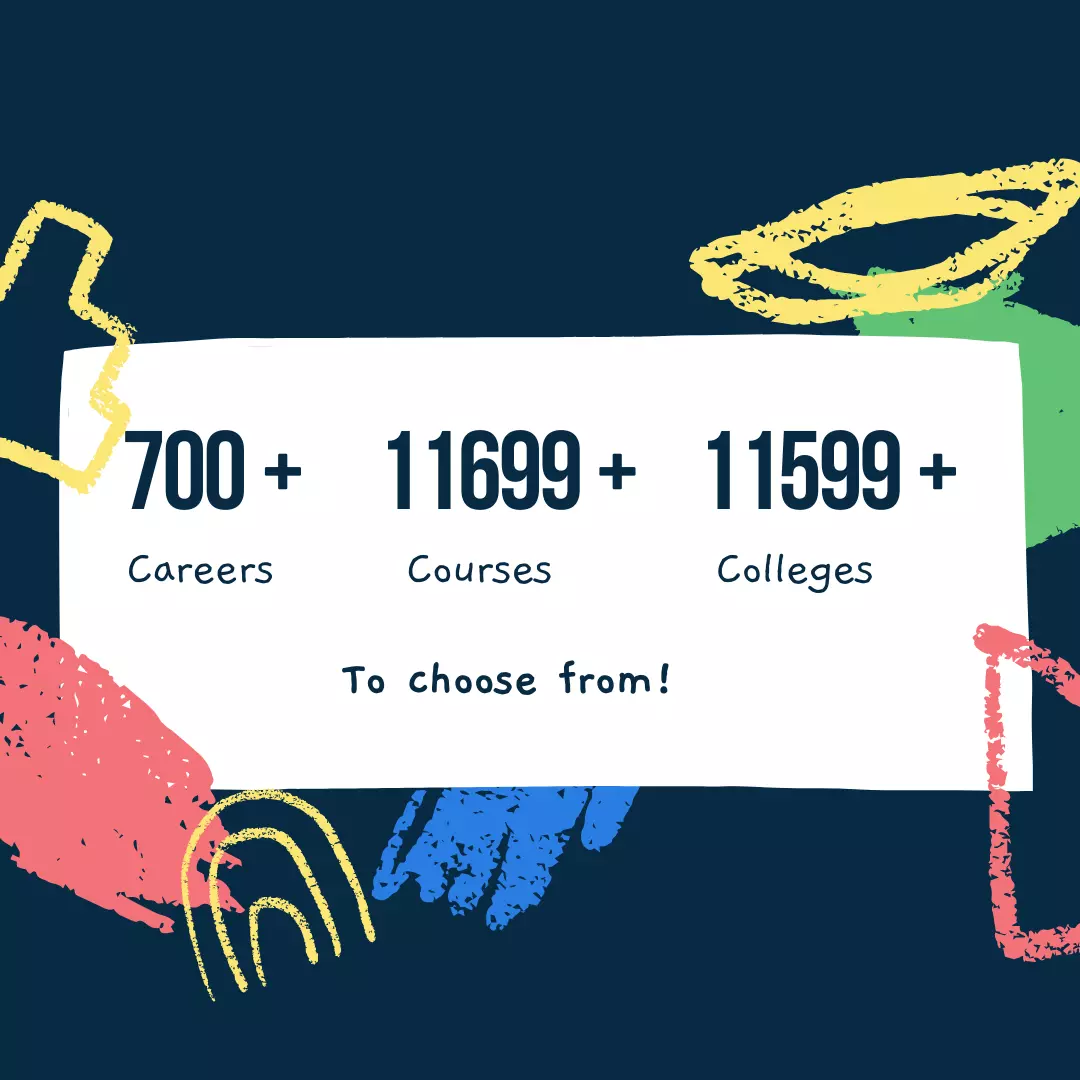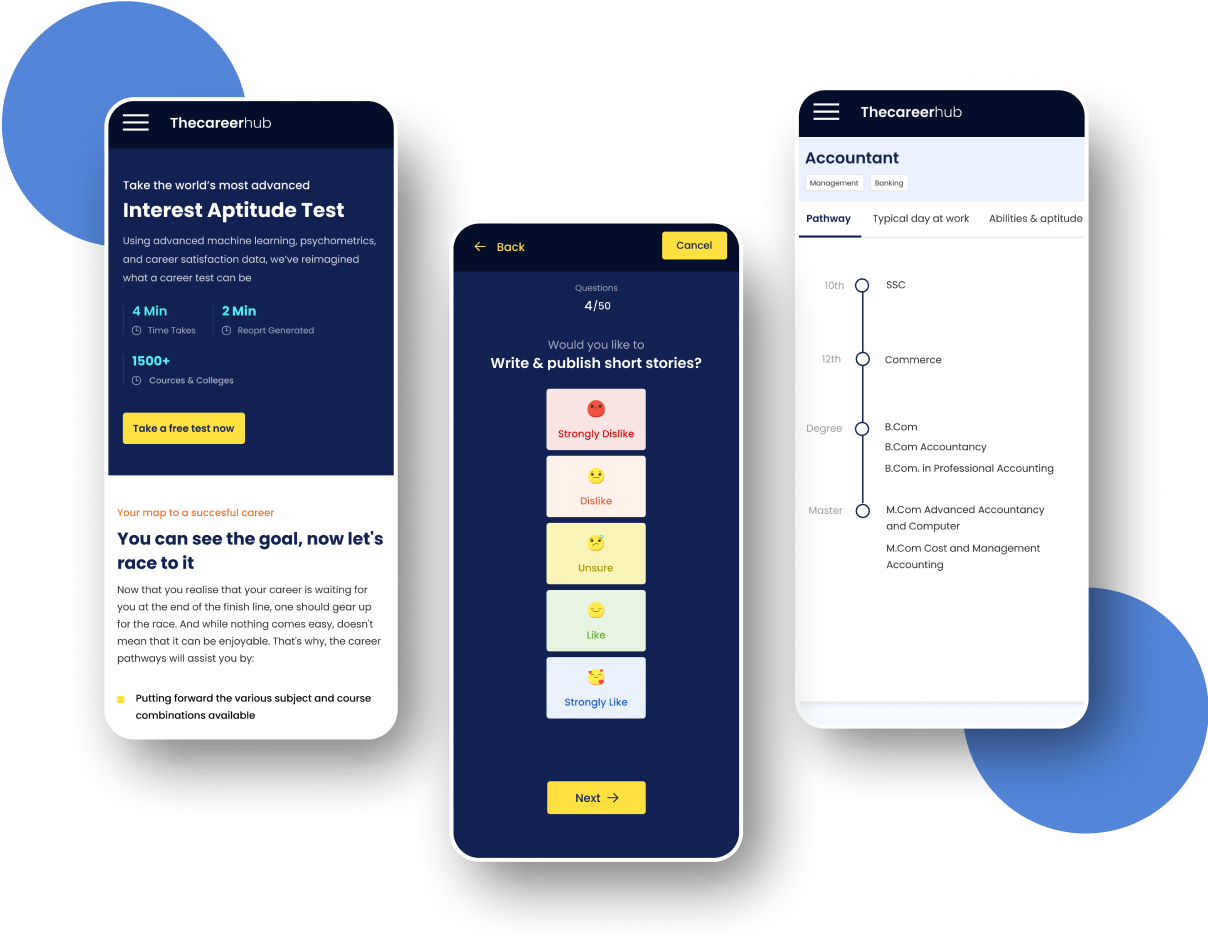What does Aptitude signify?
Your intrinsic ability to accomplish a variety of professions is referred to as aptitude. Aptitude is determined by your intrinsic ability or capacity to learn, as well as your habits and dispositions. Your aptitudes describe how easily you can pick up new abilities, whether they come naturally or are taught to you. When we say you have a high aptitude for talent, we're referring to your ability to learn and perform a skill. Such abilities might be used to forecast a child's future performance. Aptitude is a skill that you can learn fast or that comes easily to you. Knowing your skills is essential while looking for a new job or considering a career shift since it will guide you in the proper route. It will be more pleasurable to work in occupations that use your skills.
What is an aptitude test in Amrawati?
The Amrawati Aptitude Test is a tool for assessing one's abilities and interests, whether they are well-developed or still developing. Aptitude tests may help you decide which career route to pursue and prepare for it. The online aptitude test & psychometric exam is the most widespread and time-tested assessment used throughout the academic year and for corporate management.
A career aptitude exam may help you understand the link or relationship between your cognitive abilities, career sectors, and work performance. The aptitude test will always provide a profile that indicates one's talents as well as areas in which one need to develop.
In Amrawati, an aptitude test is a common way of establishing a person's suitability for a certain job. As a result, aptitude tests are administered to persons who are considering changing jobs or who want to advance in their existing ones. As a result, everyone is encouraged to take the aptitude test, which may subsequently be utilised to help people plan and execute their careers via Career Counselling.
Standardised aptitude testing is increasingly more accessible. Children in Amrawati may take an online aptitude test that produces results in minutes and is free of human error and bias.
In Amrawati, the Benefits of an Aptitude Test
Aptitude tests are often used to assess candidates for specialised college courses, professional degrees (such as business and law), and company recruiting and employment. In any case, rigorous school tests might be utilised to track future potential. The following are some of the advantages:
- This course will help you prepare for the career of your dreams.
- Conducts a SWOT Analysis on your behalf
- Parents, guardians, and mentors are educated about their children's abilities and interests.
- Ensures that they are on course to meet their career goals.
- Creates solutions for getting around roadblocks.
- It educates them about a certain field's needs.
- Grooming for Educational Reasons is a grooming service for educational purposes.
- Provides information on a wide range of occupations, as well as their educational requirements.
As a result, both students and businesses employ aptitude tests for a variety of objectives, including SWOT analysis, topic selection, and career development. The Aptitude Test analyses acquired skills and capacities based on the person's history and normalised outcomes. As a consequence, there's no need to limit oneself to one's skills while still emphasising professional options based on abilities. By focusing on all components, it promotes the opportunity to keep all professional alternatives open.
When is it appropriate to take an aptitude test?
The Aptitude Test is available in Amrawati at Brainwonders career counselling centres.
It may be used in conjunction with DMIT Test and IQ Test analyses for advanced mapping (report). When choosing one's future job path, it's usually best to be broad and specific; similarly, recognising one's abilities, aptitudes, hobbies, and natural characteristics is crucial.
What is the purpose of Amrawati's aptitude test?
The aptitude test evaluates the qualities listed below, which may be used to influence personal, social, and professional growth.
Visualization of Space
Manipulate and rotate 2D and 3D characters and objects in your imagination.
Understanding Numbers
Calculation and mental arithmetic are examples of math skills.
Creativity
You must be able to think abstractly and beyond the box in contextualised knowledge.
The ability to communicate in a foreign tongue
Reading comprehension, grammar, and spelling are all put to the test.
Perception Accuracy and Speed
Taking important judgments depending on the information provided
Mechanical understanding
Having a basic understanding of technological ideas and principles
What are the many kinds of abilities?
1.Verbal Reasoning:
The first stage in the procedure is to use verbal reasoning. Verbal reasoning is a method of evaluating a person's comprehension of written material. The verbal reasoning aptitude exam evaluates a person's ability to perceive, understand, spell, and apply proper grammar.
A popular technique to measure verbal thinking is to provide a paragraph or numerous paragraphs and ask questions about them.
The test taker is given four or five different spellings of the same word or four or five unique words in the spelling portion, and they must pick the one that is correctly spelt.
The grammar section of the verbal reasoning exam will provide the test taker with several statements and ask them to choose the most grammatically correct sentence.
Deciphering words and their meanings is another issue. You could be asked to describe a phrase or choose a word that is the polar opposite of the highlighted or bolded term.
These questions appear on most general aptitude tests since most vocations need you to comprehend and make decisions based on verbal or written information, or to convey that knowledge to others.
2. Numerical Analysis:
Numerical reasoning blends a person's statistics and reasoning talents. Aptitude tests are used to evaluate a person's knowledge of numbers, number sequences, graphs, tables, and calculations, such as mathematical equations, all of which contribute to a clear picture of Numerical Reasoning.
To put it another way, this skill set includes basic numeracy.
Aptitude tests are often employed in administrative and clerical positions, as well as graduate and management examinations.
Numerical critical thinking and data interpretation tougher problems provide blocks of data that must be altered and analysed.
Employers often want to see evidence of your ability to deal with numbers, even if it isn't a crucial component of the job, therefore these questions appear on most general aptitude tests.
3. Abstract Reasoning:
Evaluate your ability to consider angles and shapes abstractly. Abstract reasoning and diagrammatic reasoning tests examine the ability to comprehend a pattern's underlying logic and then find a solution.
The ability to think abstractly is regarded to be the best indicator of fluid intelligence and the ability to learn new things quickly.
These aptitude tests are quite effective when it comes to hiring people for technical jobs that need them to deal with abstract notions or ideas. They may also be used to evaluate abstract thinking abilities.
Because they are the most comprehensive assessment of your overall intellectual capacity, you will almost certainly see some of these questions on every test you take.
4. Mechanical Reasoning:
Mechanical reasoning is defined as the ability to recall forms and things in the proper order. The next sections of the test will assess your knowledge of physical and mechanical principles such as pulleys, levers, and fundamental electrical circuits.
Answering these questions does not need specialised knowledge; rather, it demands a basic understanding of the ideas.
The military (Armed Services Vocational Aptitude Battery), police agencies, fire departments, and several craft, technical, and engineering businesses all use mechanical reasoning questions.
5. Spatial Reasoning:
Your capacity to manage two-dimensional shapes or view three-dimensional things as two-dimensional representations is assessed by spatial reasoning.
Engineering, architecture, surveying, and design are examples of manufacturing, technical, and design businesses that rely on blueprints and drawings.
It's also beneficial in a variety of industries where monitoring interactions between three-dimensional components is crucial.
Common visual assembly and disassembly activities used to measure spatial ability include visual assembly and disassembly of rotated or flipped items.
Clerical Reasoning is a test that evaluates a person's attentiveness and correctness.
These tests are often rated on speed and accuracy.
They're most often used in administrative and clerical interviews, where mistakes may be expensive or dangerous.
This may be seen in financial services, legal services, and healthcare
What is the most efficient way to study for an aptitude test?
Giving an exam may be stressful, and this might influence the outcome. Individuals taking an aptitude test should have a good night's sleep to relax and correctly answer the questions, as well as carefully read the instructions on the test paper.
Individuals should take a few practise exams ahead of time to acquire a sense of the kind of questions that could be asked. Candidates may practise aptitude tests to improve their speed since they are timed.
They may be able to figure out which questions they won't be able to answer if they take the test ahead of time.
What is the most efficient way to take a test of aptitude?
- After registration, take the test.
- The Brainwonders aptitude exam is a multiple-choice test that is timed. (This may be done both online and offline.)
- Evaluation
- As an objective test, the consumers' inputs are graded using a set key.
Report & Interpretation
- A thorough report, as well as an aptitude profile, is developed and generated.
- Certification and direction
- The therapist examines the findings in detail, taking into consideration the client's unique needs, and gives some developmental suggestions.
Everyone should take a professional aptitude test.
Junior Primary Students' Aptitude Test (7-8 years)
As the child begins to explore the area of formal education, parents, teachers, and other mentors may use the analysis to set specific goals and choose instructional tactics.
Senior Primary Students' Aptitude Test (9-10 years)
Middle school is a great time to observe how a child grows and comprehends certain concepts and abilities, and the findings may be used to shape the child in ways other than academics (11-12 years)
Students must pursue extracurricular interests as school courses expand into various sectors centred on certain topics and themes, each with its own set of criteria.
Secondary School Aptitude Test (13-14 years)
The test profile would be able to provide a SWOT analysis of the kid's present path, which the youngster and relevant counsellors could use to look into other career options and overcome any personal obstacles to their professional goals.
Higher Secondary Aptitude Test (15+ years)
You've realised that at this point, you can't choose a job solely based on your interests and abilities. Future-oriented factors like job satisfaction, opportunity, and work-life balance should emerge, and then a specific professional path may be pursued.
Many businesses use aptitude tests not just during the hiring process, but also every month to evaluate their employees' performance. Adults and working professionals, on the other hand, could make use of it to broaden their horizons.
Aptitude exams and IQ tests are sometimes confused, even though they are two quite distinct types of examinations with very different outcomes. In other words, an IQ (Intellect Quotient) exam identifies a person's statistical intelligence, and an aptitude (General Intellect) test evaluates how efficiently that intelligence may be used in a variety of situations.
Both aptitude and IQ tests are utilised in career counselling and job search since one gives information on one's intrinsic cognitive ability while the other provides information on how well one will be able to use these talents in everyday life. Other evaluations, such as personality tests and interest tests, are used to augment these exams. When all of these exams are taken together, the test taker gets a comprehensive picture of his or her job options.
Some of the features of the Brainwonders Online Aptitude Test are as follows:
You can take the Brainwonders Aptitude test from anywhere in the world because it is available online. All that is required is the login and password provided by the firm.
Dependable: A reliable measure accurately quantifies a concept throughout time, across individuals, and in a range of circumstances. As a result, an aptitude test is created in such a way that its results may be trusted. This means that, although a person's perspectives may change with age and circumstance, they are typically stable and consistent throughout time.
Validity: A measure is considered to be valid if it accurately measures what it claims to measure. This implies that, regardless of whether the exam is utilised for educational, therapeutic, or diagnostic reasons, it will eventually measure a wide range of abilities. The term "validity" refers to whether or not the test questions are accurate enough to assess a certain quality.
Exams are given and assessed in a predictable, or "standard" manner. The same questions, administration settings, scoring methodologies, and interpretations are utilised every time a standardised exam is given. When a test is standardised, it adheres to a set of rules, which reduces the likelihood of scoring and administration mistakes. As a result, a gifted adolescent will do highly on two separate aptitude tests, both of which are standardised and so reliable. The Brainwonders exam is a timed online quiz with step-by-step instructions.
Norms: By describing the score distribution of a test in a representative sample, norms offer a framework for comparing individual results. Norms may be used by test takers to aid in the analysis of test results. Test users may utilise produced scores to compare, explain, and make the best decisions by understandably modifying raw data. The exam's findings are then used to evaluate an individual's performance. For example, aptitude scores are determined using norms based on prior test takers' outcomes.
Rapid and effective: You may take the Aptitude test online at Brainwonders. The online aptitude tests are easy to use and give instant feedback.
Aptitude exams may aid your job success in the following ways:
Aptitude tests are used in a range of occupations to assess a person's talents. The results of the test assist the career coach in evaluating and recommending appropriate career possibilities for students based on their skill sets. Furthermore, the outcome increases people's faith in their ability to work hard to attain their professional objectives.
Artificial Intelligence is in charge of aptitude exams that are not impacted by external influences at the moment. The aptitude test's most essential indications are students' raw intellect and capacity.
The following are the phases towards recognising your abilities: The first step toward success is to identify and map one's strengths to professional goals.
Do the following to figure out what personality type you are: An aptitude test not only serves in the selection of the best professional path but also in the comprehension of the personality of the test taker. Students who are aware of their personalities, career alternatives, and abilities are better equipped to make educated judgments. Based on the findings of the aptitude test, students may get the appropriate education or skills to help them succeed in their jobs.
This isn't conclusive: One of the most important features of an aptitude test is its inconclusiveness. Multiple-choice questions may be used to assess students' abilities. The data might be used as a benchmark for comparing people's IQ levels.
Amrawati is a significant learning and educational centre. Educational institutions are known for delivering a well-rounded education to their pupils. Brainwonders Amrawati's career counsellors have a wealth of experience, education, and information. We don't just provide career advice; we design a personalised action plan for each applicant to help them achieve in their profession of choice. Students may take a recognised Aptitude exam, Interest test, Personality test, and DMIT test at Brainwonders job career counselling centre. These assessments may be used by professional counsellors to examine a student's intrinsic qualities, talents, and potential, giving them an advantage in selecting which career track is ideal for them.











